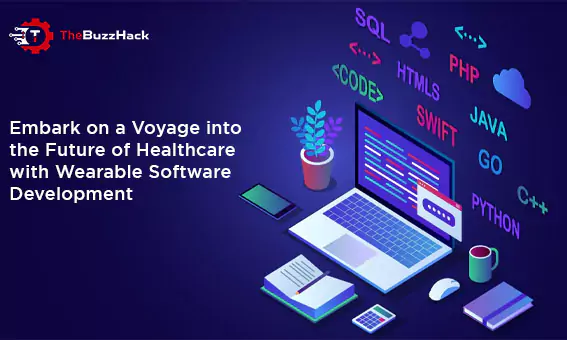
Embark on a Voyage into the Future of Healthcare with Wearable Software Development
In the ever-evolving landscape of healthcare, future technological progress has played a pivotal role in redefining medical approaches. Among these breakthroughs, the incorporation of wearable software development emerges as a revolutionary force. While originally designed for fitness monitoring, wearable devices have transcended their initial purpose and now wield a substantial influence within the realm of healthcare. This piece delves deep into the profound implications of wearable software development in healthcare, examining its merits, obstacles, and potential future prospects.
In this blog post, we provide a comprehensive exploration of wearable software development in the healthcare sector. Whether you are searching for top-notch solutions to enhance your healthcare services or aiming to adopt cutting-edge practices in wearable software development for healthcare, this article pledges to transform healthcare industry practices and enhance the well-being of patients.
The Emergence of Wearable Technology
Over the past decade, there has been a remarkable surge in the popularity of wearable devices, encompassing a wide array of products such as smartwatches, fitness trackers, smart clothing, and even medical implants. These devices are equipped with sensors, processors, and connectivity features, enabling them to gather, process, and transmit diverse sets of data. The integration of software development into wearables has transformed them into advanced tools capable of real-time monitoring of an individual’s health and well-being.
Information technology companies offering wearable app development services recognize the potential to provide unique solutions to various industries, with a particular emphasis on healthcare. As software companies have come to realize the importance of tailoring solutions to meet specific industry needs, there is a growing desire among industries to modernize their daily practices. In light of this, we present some innovative concepts that healthcare sectors can consider adopting to bring about the positive changes they seek to achieve
What advantages does wearable software development offer in the healthcare sector?
Wearable software development has ushered in a healthcare industry revolution, fundamentally transforming healthcare operations and contributing to the establishment of a more efficient and effective healthcare system. In this context, we provide invaluable insights and best practices to inspire innovation in the healthcare sector. Consider the following key advantages that may motivate you to elevate your healthcare system:
Personalized Healthcare: Cutting-edge wearable devices equipped with sophisticated software can collect vital information about an individual’s heart rate, sleep patterns, physical activity, and even detect early indicators of potential health issues. This wealth of data enables healthcare providers to create tailored treatment plans that align with an individual’s unique health profile.
Remote Monitoring: Wearable technology empowers healthcare professionals to remotely oversee patients’ health status, particularly crucial for individuals dealing with chronic illnesses or recovering from surgery. This capability diminishes the need for frequent in-person appointments while delivering real-time updates to medical practitioners.
Preventive Care: Wearable software can proactively identify health risks before they progress into more severe conditions. For instance, algorithms can detect irregular heartbeats, which might signify atrial fibrillation, prompting timely medical intervention.
Patient Engagement: Wearables foster active patient participation in managing their health. Through gamified health and fitness goals, individuals are motivated to make healthier lifestyle choices, resulting in enhanced overall well-being.
Data-Driven Insights: Wearable devices generate copious amounts of data that provide valuable insights into population health trends. Healthcare organizations can harness this data to develop effective public health strategies and policies.
The credit for this transformative progress goes to dedicated wearable app developers who champion cutting-edge technology. These seasoned experts are invaluable allies for healthcare industries seeking top-tier solutions and the effective implementation of advanced technologies.
What Challenges and Factors Should Be Considered in Wearable Software Development?
While wearable future software development in the healthcare sector holds significant promise, it also presents a range of challenges that warrant careful consideration. We have compiled these challenges to provide you with a comprehensive overview of the landscape and equip you to proactively mitigate potential risks. Familiarizing yourself with these issues will yield valuable insights for your software development endeavors.
Safeguarding Data Privacy and Security: The gathering of sensitive health data through wearables demands robust measures to ensure the privacy and security of this information. It is imperative to shield patients’ data from unauthorized access and potential breaches.
Ensuring Accuracy and Reliability: Wearable devices must consistently provide precise and dependable data to support healthcare decisions with trustworthy information. Regular calibration and validation of these devices are essential to maintain their effectiveness.
Adhering to Regulatory Compliance: Wearable software categorized as medical devices must adhere strictly to regulatory standards to ensure patient safety and device efficacy.
Seamless Integration with Healthcare Systems: The seamless integration of wearable data into existing healthcare systems is crucial for effective patient management. Addressing interoperability challenges is key to enabling healthcare professionals to easily access and utilize data from wearables.
Encouraging User Adoption and Engagement: To fully harness the potential of wearable future software, fostering user adoption and sustaining long-term engagement are paramount. Designing user-friendly interfaces and promoting consistent use of wearables are critical considerations.
These challenges are commonly faced by organizations in this field. However, identifying and comprehending them from the outset will empower you to proactively address any issues that may arise. Being well-prepared and armed with clear ideas will enable you to engage confidently with wearable app development companies.”
What Does the Future Hold for Wearable Software Development in Healthcare?
The future of wearable software development in healthcare is highly promising, foreshadowing a time when these devices will become indispensable within the realm of medicine. Throughout this discourse, we have introduced you to several distinctive aspects of wearable future software development in healthcare:
Advancements in Diagnostics:
Wearable devices are on the cusp of further evolution, incorporating increasingly sophisticated diagnostic capabilities. This will facilitate early disease detection and precise monitoring of individuals’ health conditions.
Revolutionizing Telemedicine:
Wearables are poised to play a pivotal role in the telemedicine revolution, empowering healthcare providers to remotely assess patients’ conditions and deliver timely interventions.
The Era of Precision Medicine:
The integration of wearable data, genomics, and artificial intelligence is paving the way for personalized, precision medicine. Treatment plans will be customized based on an individual’s genetic makeup and real-time health data.
Collaboration and Research Opportunities:
The wealth of data gathered from wearables will foster collaboration between healthcare institutions, technology companies, and academic researchers. This collaborative effort is set to drive breakthroughs in medical science.
By considering these facets, you will develop a comprehensive understanding of how wearable software development is poised to transform the healthcare industry. These developments are well-positioned to assist you in making informed decisions and accessing the essential features offered by wearable software development.
Conclusion
The development of wearable future future future software is having a profound impact on healthcare, ushering in an era of personalized, data-driven, and remote healthcare practices. These devices are not only transforming the way we manage health but also paving the way for innovative approaches in diagnosis, treatment, and preventive care. As wearable technology continues to advance and mature, its potential to revolutionize healthcare is undeniable, offering the promise of patient-centric, efficient, and effective medical practices as the future standard.
Read more: Exploring Leading Frameworks and Tools for Progressive Web App Development


